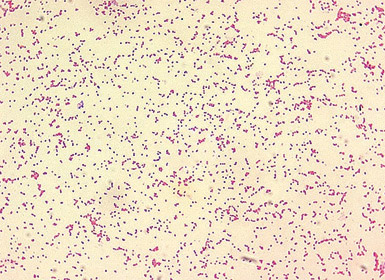Infertility in the Bitch - Infectious Agents
This information is an extract from Lecture 2 presented at DOGS NSW Dog Breeder & Enthusiast information seminar. Presented by Dr Robert Zammit BVSc – Vineyard Vet
Though many infectious agents are capable of causing issues the main thrust from this large group of organisms comes from either viral or bacterial.
Canine Herpes Virus (CHV)

Figure 1.
In older dogs, infection with canine Herpes is usually asymptomatic. Some cases can develop severe respiratory symptoms but these cases are rare.
Sever symptoms occur when a pregnant female becomes infected. The puppies can be aborted or they can be born normally but the whole litter dies within 21 days from birth. The pups will cry, some may seizure, they fail to thrive and die quickly once symptoms commence. On post-mortem, the pups display distinctive "target" zones on the liver and kidneys.
Testing of samples from a deceased pup can also aid in diagnosis. Both histopathology and swabs can be used to confirm the diagnosis, though swabs will need to be sent (and arrive in good condition) to a laboratory in the Czech Republic.
Vaccine is available for pregnant females in some countries in Europe but does not give permanent immunity against Canine Herpes.
Some females display small vesicles around the vulva, which can be an indication of CVH.
Some authorities believe it is better for a bitch to become infected with the virus well before pregnancy. This gives her immunity without any signs of detriment to the female. The problem is to find a litter that is infected
so that this process can occur. Fortunately, the incidence of CHV is reasonably low, but if you do get a litter that displays symptoms, it is better to expose all you kennel to it as immunity is achievable in the majority of cases. Some dogs will not have a life-long immunity and the concern is that some males and females may become carriers. The risks are not always clear so it's better to discuss this with a veterinary reproductive specialist, who will often consult with a pathologist on the best course of action for your specific situation.
Brucellosis - Canine and Suis

Figure 2.
These two bacterium have been found in dogs, causing inflammation of the reproductive tract, abortion in females and infertility in both males and females. Brucella canis is of course a canine bug, but Brucella suis is actually a bacteria of pigs. Both can also affect humans so strict hygiene is necessary to avoid zoonotic contamination.
Brucellosis Canis is not found in every country around the world. Hence, when importing from one country to another, it may be a requirement that the dog is screened for the disease by means of a blood test.
Typically, pregnant females infected with Brucellosis will abort around 40 to 55 days or will go to term. Producing still born or weak puppies that die soon after whelping.
If a pregnant bitch shows signs of lethargy, swollen lymph nodes, difficulty walking and a vaginal discharge, then Brucellosis should be suspected. Blood tests should cover the canis and suis variety of this dreadful bug.
Images
Figure 1: Canine herpes Virus (CHV) as it appears under the microscope.
Figure 2: Microscopic image of an extraction of Brucella canis, which is a gram-negative coccobacilli found in dogs, and appears as fine sand under microscope when stained. Source: Public Health Image Library, Centers for Disease Control and Prevention, Larry Stauffer (2002).
Article appeared in DOGS NSW magazine, January 2019 edition.




